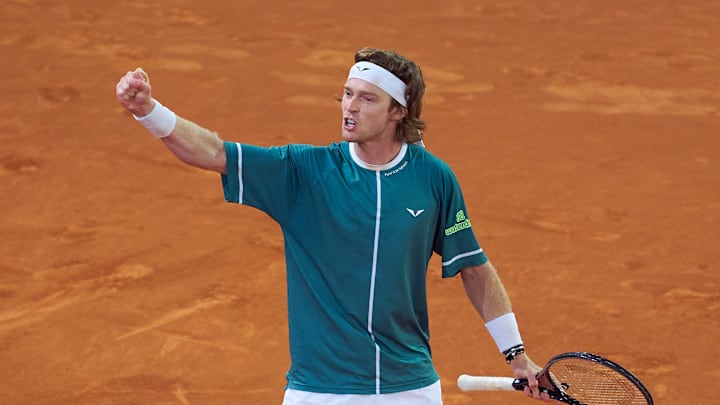Felix Auger-Aliassime had no business even reaching the final of the Madrid Masters. He did not earn his way there. That is not meant as a personal affront to the Canadian but a simple statement of fact. He played only three full matches out of six and only one half-set in the quarterfinal and semifinal combined. His opponents had injuries that would not allow them to compete fully in matches against him.
Auger-Aliassime got fortunate again ahead of the final in Madrid. Andrey Rublev, a more successful player over the course of his career than Auger-Aliassime and the higher-ranked player, was ill. He was running a high temperature and clearly not feeling 100 percent. He was subdued throughout the match, compared to his normal effervescence, and did not seem to move around the court as briskly early in the match.
In other words, whatever witchery or voodoo Auger-Aliassime might have been working before most of his matches in Madrid, he needs to keep doing that. It obviously works against most but did not against Andrey Rublev.
Andrey Rublev shakes off Felix Auger-Aliassime's dark magic to win Madrid Masters
To be fair to the Canadian, though, he did play extremely well against Rublev at the beginning of the match. For much of the first set, when Auger-Aliassime landed a first serve, which was often, Rublev was unable to return the serve. This was over half the time so Auger-Aliassime was able to dictate play with his serve alone.
He also did not make most of Rublev's service games easy for the Russian. Auger-Aliassime broke the Russian twice to get the set to 4-1 and one might have questioned whether Rublev should have just allowed the Canadian to quickly get the first set victory in order to sustain whatever stamina he had for set two and - hopefully from his standpoint - beyond.
Rublev did begin to round into shape in the second set as each player held serve. Auger-Aliassime was still hitting the ball as crisply and using all angles of the court, so there was little doubt about his form. The match turned out to be not as easy as the Canadian hoped, however.
Auger-Aliassime seemed to tire somewhat at the end of the second set. His serve less well-placed and his forehand cross-court winners were less abundant. This makes sense as while Auger-Aliassime got breaks heading into the final and not having to play very much, he also had not been extended in any match. While Rublev appeared to become a bit more spry, Auger-Aliassime diminished and was broken by Rublev at 5-6 to allow the Russian to take the set.
The third set featured both players holding serve but with many games tightly contested. Auger-Aliassime seemed to find ways to come through his bombastic serves when almost broken while Rublev took advantage of iffy Auger-Aliassime backhands.
Not only did Rublev appear to be more energized in the third set, he seemingly hit with more pace. He was the Rublev most of gotten accustomed to when he tries to power his way through any issues. He figured out Auger-Aliassime's second serve and attacked it.
By the end, though, the match mirrored the excellence of the women's Madrid final between Iga Swiatek and Aryna Sabalenka. Both players would have deserved the victory, but Rublev's calm, a rare thing for him in his career, allowed him to keep his poise in the biggest moments at the end, get the late break of the Canadian (the last point on an anti-climatic double-fault by Auger-Aliassime), and get the victory 4-6 7-5 7-5.
With the victory, Rublev moves back to No. 6 on the ATP tour. He earned his 16th title on tour including his second Masters 1000 title. Now he will try to get past the quarterfinals at his first Grand Slam event when he participates in the French Open in late May.
